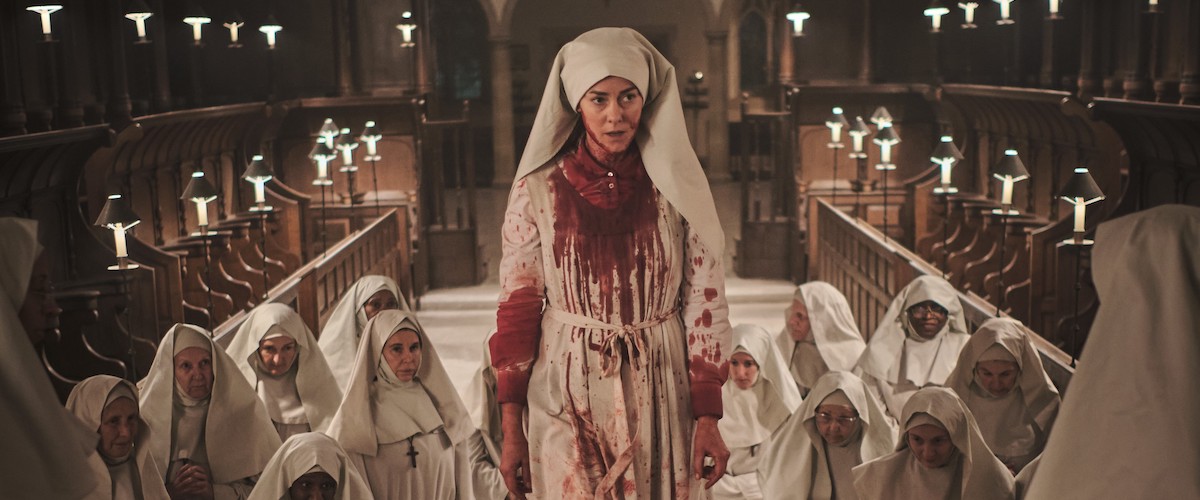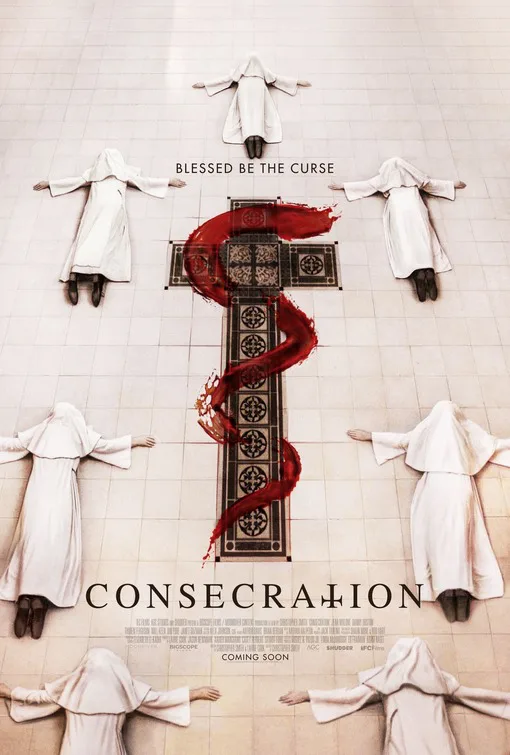“My brother always believed I had a guardian angel. I used to believe in nothing. Now I’m not so sure,” a voiceover tells us just as a nun pulls a gun and aims it directly at the camera. Thus begins Christopher Smith’s latest horror film, “Consecration.” If only the rest of the film were as invigorating as this opening sequence. Instead, the film proves to be just another retread of “spooky” Catholic-themed horror tropes without adding any insight or originality to the subgenre.
The voiceover belongs to Grace (Jena Malone, who can’t pick an accent. British? Scottish? Who knows!), who has come to the Mount Saviour Convent in Scotland, after she learns her brother, a priest, has died there under mysterious circumstances. The grounds of Mount Saviour date back to the 12th century when its original inhabitants—known as the Knights of the Morning Star—came to seek penance after the Crusades. It’s also very probably cursed.
Grace learns from DCI Harris (Thoren Ferguson) that her brother killed another priest and then killed himself. Grace refuses to believe he is capable of either act. Neither does the kooky Mother Superior (Janet Suzman), who tells them he was possessed by a demon, and both deaths were in order to overcome that possession. Also in the mix is Father Romero (Danny Huston), who has come from the Vatican to re-consecrate the grounds to cleanse them after the brutal deaths.
From there, the film goes off the rails with copious flashbacks and possible hallucinations of Grace’s troubled childhood, creepy-looking religious ceremonies happening in the 12th century, and visions of nuns and priests flinging themselves off the cliffs to their deaths. None of these various threads are ever woven together very successfully, leaving the core story muddled, and the final reveal both preposterous and incredibly obvious.
Malone is out of her element here, never able to find a modicum of truth in Grace’s journey. Is she a grieving sister determined to uncover the truth of her brother’s death? A lost soul in need of a spiritual awakening? A woman who suppressed an abused childhood confronting the abuser? Any one of these motivations would have worked to root the performance in some sort of emotional truth, even when the plotting swerves into the realm of the fantastical.
None of the supporting characters are given much depth, either. Father Romero seems to exist solely to share exposition with the audience by explaining things to Grace. Mother Superior and her coterie of nuns put on a spookshow every chance they get, either through cryptic dialogue or the mutilation of their bodies. They’re eerie, sure, but each nun that Grace interacts with has no unique personality outside of their zealous suffering. “Consecration” doesn’t see them as people, just vessels for portentous speeches and ritual violence.
Along with Smith and co-writer Laurie Cook’s cliche-ridden script, most of the imagery of the film is equally lazy. Figures float behind Grace as she investigates various rooms. Often the nuns contort their heads to the side for absolutely no reason, as if they’re trying out to be extras in Ken Russell’s “The Devils.” Several sequences appear to be lifted directly from that far superior film about religious mania and fanaticism.
Despite gorgeous locations, co-cinematographers Rob Hart and Shaun Mone shoot the verdant hills and ancient buildings without much panache, favoring murky darkness at almost every turn, whether characters are inside a hospital, police station, rectory, or out on a cliff. There’s also little visual distinction between the timelines, blending inexorably together in a way that might have been interesting if the actual throughline weren’t so muddled in execution at the script level.
The voiceover from the beginning repeats itself as the film hurtles towards its preposterous ending, the previous 90 minutes apparently existing to explain to the audience why Grace is now “not so sure” what she believes, yet most of what is revealed has only been shown to the audience, not to Grace herself. Perhaps it’s too much to expect any kind of logic in the plotting of a film like this, but is it too much to ask that the structure have some?
Grace herself hasn’t gone through any kind of crisis of faith. There is no moment in which Grace has a “come to Jesus” moment, a conversation with God. Nothing. This is a film that uses a surface-level understanding of the rituals—and violent history—of the church as a backdrop for its action. It wants to be about ancient mysticism and pageantry and corruption but has no concept of the spirituality in which these things are rooted.
A basic understanding of this spirituality is necessary for an exploration of the tension between devotion and hysteria. Unfortunately, “Consecration” has no real interest in truly examining that tension while also proving itself to be frustrating on a pure horror level due to its overly complicated script, reliance on visual cliches, and lackluster ending.
Now playing in theaters.




















